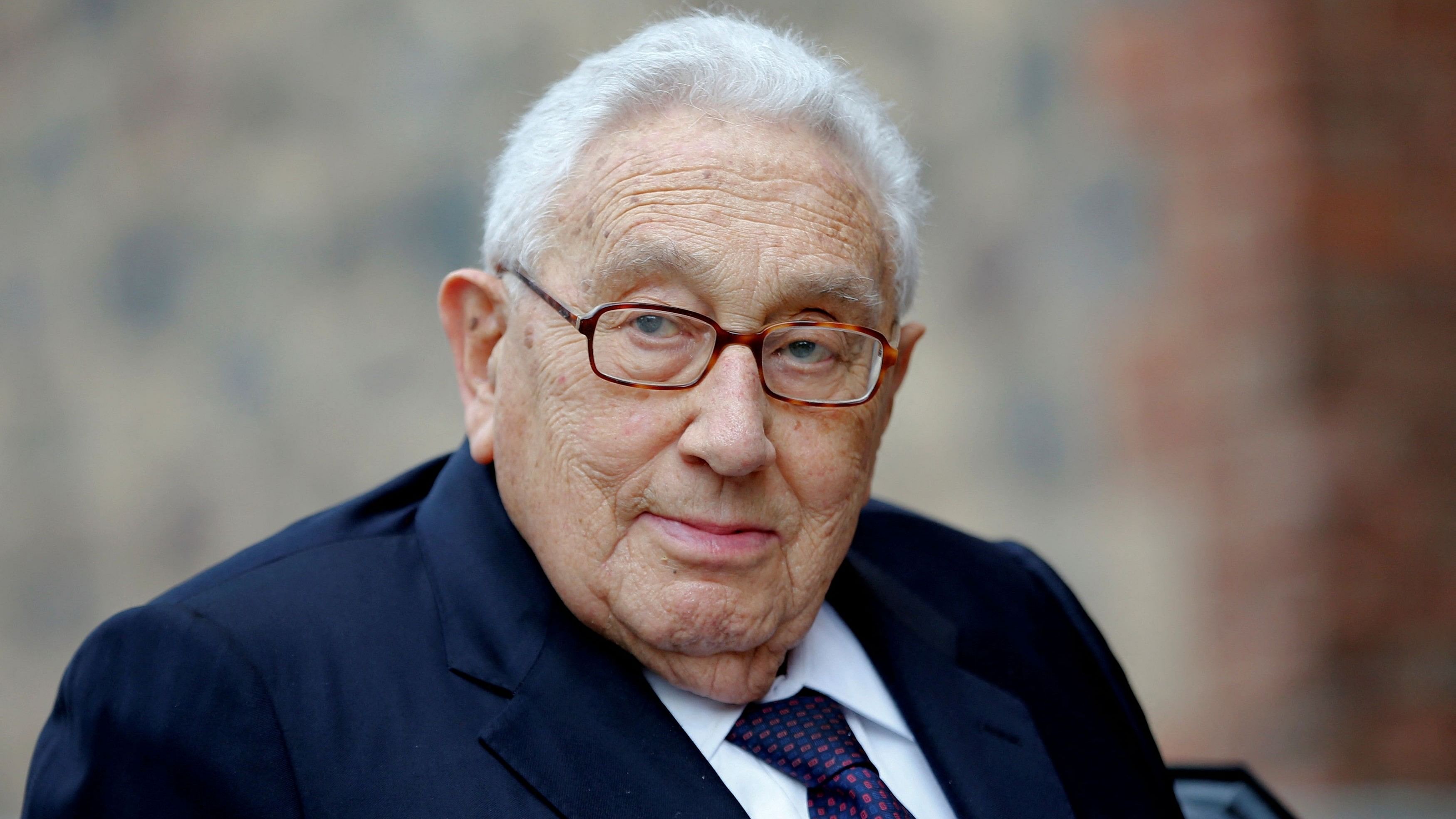
Former U.S. Secretary of State Henry Kissinger
Credit: Reuters Photo
An era ended with the passing of Henry Kissinger, the former US National Security Adviser and Secretary of State under Presidents Richard Nixon and Gerald Ford who continued to enjoy an outsized recognition for his strategic and foreign policy thinking, if not influence, long after leaving government and right until his death last week at 100. While the decisions taken during his time in office continue to impact the Middle East, China, and Southeast Asia, they continue to be subjects of intense political debate. Perhaps, his role in the context of South Asia warrants a revisit.
Kissinger is widely, and rightly, derided in India for the derogatory remarks he made about former Prime Minister Indira Gandhi and for his efforts to scuttle India’s plans during the 1971 war. While Kissinger exhibited unparalleled disdain toward Indians, politically India’s solidarity with Cuba, Vietnam and the USSR had positioned it closer to the communist camp, for which he had nothing scorn.
One reason why Kissinger still looms large over global politics is that he was at the helm of policymaking under two US Presidents during a key period in the Cold War. Under his watch, propagating US influence and preventing the spread of communism were top US priorities. Kissinger served a President who had developed a certain fondness for Pakistan since his initial visit there in 1954. During Nixon’s tour of Asia as Eisenhower’s Vice President, he admired Pakistan’s carefully presented anti-communist stance, while he was dismayed at what he perceived as India’s reluctance to take on the
US view that communism posed the most significant threat to civilisation.
From a geopolitical perspective, Pakistan was a part of CENTO, a Cold War military alliance. Conversely, India declined to vote against the Soviet Union for its invasion of Hungary in 1956. Kissinger, a Machiavellian figure, was primarily interested in safeguarding the interests of his prince. Analysts across the trans-Atlantic world viewed the anomaly in the subcontinent through the lens of ‘Great Game’ politics. This had a profound impact. The stain of Pakistan’s defeat in 1971 was a blemish on America’s global image. The irritation caused by relatively smaller powers like India resulted in a blow to the confidence, pride and prestige of the US, prompting derogatory remarks from the likes of Kissinger and Nixon.
While realism formed the basis of his understanding of geopolitical events, Kissinger’s pragmatism in policymaking was perhaps his strongest asset. When India conducted a nuclear test in 1974, Kissinger instructed his aides for a low-key response from the US. A strong draft response was rejected in favour of a more restrained approach. He accepted the emergence of another nuclear power realistically and diverted his focus to stabilising its position within the international monitoring framework. His stand at the time was to recognise India as a nuclear power on the condition that it wouldn’t aid other nations in obtaining the same status, although, ironically, it was the non-proliferationists who won the day as far as India was concerned and technology denial regimes were instituted against it.
Again in 1998, Kissinger opposed sanctions following India’s nuclear tests, advocating acknowledgment of India as a nuclear-capable nation. This astuteness was also reflected in US policy by the Clinton administration, eventually leading to the India-US nuclear deal in 2008.
What’s surprisingly little known is that diplomatic records reveal that as early as 1972, Kissinger had advocated for India and Japan to become permanent members of the UNSC. From his famous quote, “No one in D.C. wakes up concerning New Delhi,” he made a pragmatic climb down to ultimately become a significant proponent of Indo-US bilateral engagement in the 1990s. During PM Modi’s official state visit to the US in June 2023, despite his declining health, Kissinger made the journey from Connecticut to Washington to attend Modi’s address at the luncheon hosted by Vice President Kamala Harris and Secretary of State Antony Blinken at the State Department. In his 2014 book “World Order,” Kissinger portrayed India as “a pivot of the twenty-first-century order: an indispensable element due to its geographical location, resources, and a legacy of sophisticated leadership, influencing the strategic and ideological development of the regions and the order concepts it intersects.”
Kissinger’s transformed views on India in his later years mirrored his positive views about China, too. Evaluating Kissinger solely based on the impact of his decisions on Chile, Cambodia and Vietnam in a different era may not provide a full picture of his worldview. Yet, his legacy in the developing world will remain controversial as his intense ideological aversion to communism and the USSR clouded his judgements at a critical juncture in history, exacting a heavy toll on millions in the Global South.
(Mishra is Fellow, Americas, ORF, New Delhi; Fanase is a Doctoral
Candidate at CIPOD, JNU)